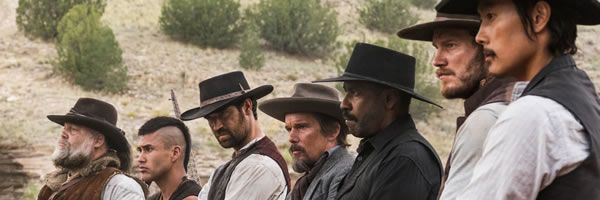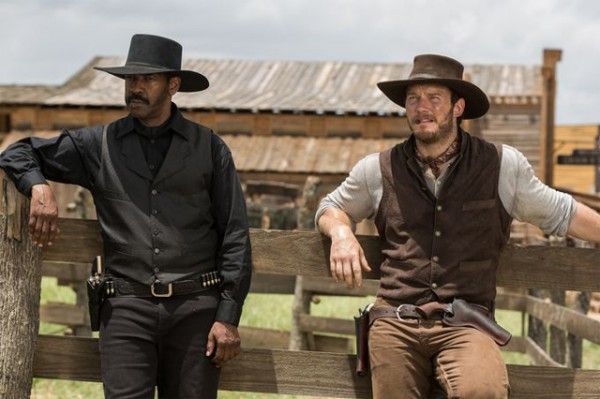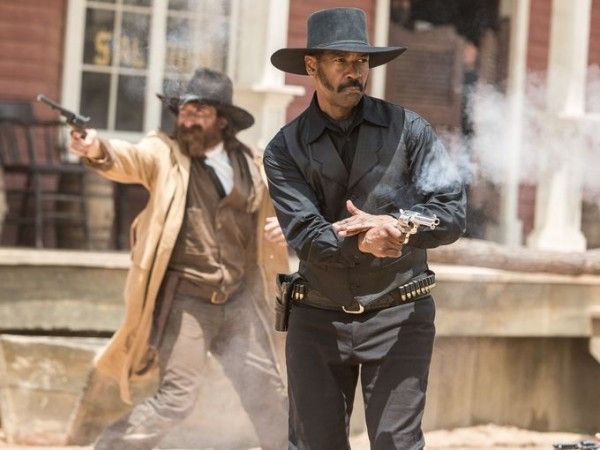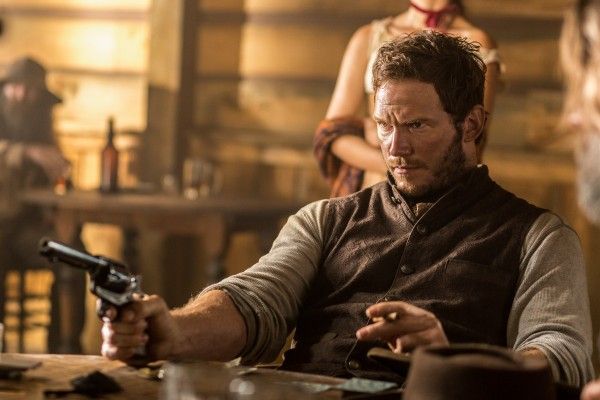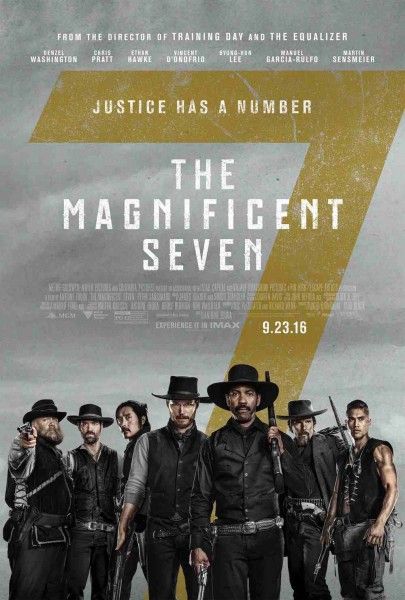[This is a re-post of my review from the 2016 Toronto International Film Festival. The Magnificent Seven opens tonight.]
Seven Samurai, aside from being a bona fide classic, has a great premise—seven warriors are hired by a small town to fend off bad guys. It’s a premise that easily transfers to other genres, such as the western. And in 1960, United Artists had the bright idea to remake Seven Samurai as a western called The Magnificent Seven, which turned out to be a pretty good film (albeit not as good as Seven Samurai, although, to be fair, not much is). Over fifty years later, MGM and Sony had the less bright idea to remake a remake and we now have Antoine Fuqua’s The Magnificent Seven, a film that’s content to be an action flick in western garb and not much else. Its jokes fall flat, its stars have little chemistry, and Fuqua seems impatient to get to the next set piece rather than invest in his characters.
The new Magnificent Seven doesn’t stray far from set-up. Rose Creek is a small town being terrorized by a mining corporation led by the nefarious Bartholomew Bogue (Peter Sarsgaard) who wants to buy up all the land at a fraction of the price. He gives the townspeople three weeks to sell, vacate, or suffer his wrath, and then shoots the husband of Emma Cullen (Haley Bennett) on his way out of town. Emma goes to a nearby town and recruits bounty hunter Sam Chisolm (Denzel Washington), who in turn brings in gambler Josh Farraday (Chris Pratt), sharpshooter Goodnight Robicheaux (Ethan Hawke), knife-wielding Billy Rocks (Byung-hun Lee), outlaw Vasquez (Manuel Garcia-Rulfo), tracker Jack Horne (Vincent D’Onofrio), and Comanche Red Harvest (Martin Sensmeier). They go to Rose Creek, they prepare to fight, and then there’s a shootout that goes on forever.
Fuqua’s new version of Seven starts at an interesting place by making the villain not only a company (as opposed to bandits like in Samurai and the 1960 original), but led by a man who equates capitalism as God and therefore a god himself. It’s a fitting villain in a time where income inequality is a pressing social issue, but the movie never follows up on it. It reduces Bogue to a moustache-twirling villain, and then mostly forgets about him for the majority of the picture. Devoid of subtext or social commentary, we’re left to wonder what’s the point when a western-remake of Seven Samurai already exists. It’s not like the 1960 version was a bad picture that could be remade into a better picture or that it was a low budget affair that would have benefited from lavish spectacle.
That means that Fuqua either had to bring something new to the table or outperform the 1960 version, and he does neither. Almost everything in the movie lacks energy. When Chisolm is getting the gang together, it feels rote and plodding. Rather than introducing us to characters we’d like to know more about, the movie provides one-dimensional sketches to illustrate that the person is good at killing and therefore a worthy addition to the team. The Magnificent Seven is never willing to invest in its characters or their relationships beyond a superficial level, and it misses obvious opportunities to do so.
For example, when we meet Jack Horne, we learn that he killed lots of Native Americans. And then they go and add a Comanche to their team. You would think this could be a source of friction for both characters, and eventually they learn to work together and respect each other (or maybe they stab each other in the back, which would still be interesting). But the only exchange Horne and Red Harvest share is when Horne learns that Red Harvest can speak English. That’s the sum of their relationship, and it’s about par for the course for how everyone interacts with each other.
It barely seems like anyone even respects each other let alone possess a willingness to die protecting their fellow mercenaries. The Seven openly despise the townspeople, the townspeople don’t try to befriend the Seven, and the Seven don’t really foster new relationships among each other. Chisolm and Farraday are pals at the beginning, and they remain pals. Goodnight and Billy are pals at the beginning and they remain pals. Nothing is challenged, formed, or reframed. It’s the adventure of seven people who are good at killing, and for Fuqua that seems to be good enough.
Is the new Magnificent Seven more action packed than its predecessors? Sure, but it’s action involving characters you don’t care about. Farraday cracks a lot of jokes, but that doesn’t make him particularly endearing. Washington is playing a badass for the umpteenth time. The only two characters who are halfway interesting are Horne, who is a devout Christian who also kills people with a tomahawk, and Goodnight, who seems to be suffering from PTSD. Naturally, the film doesn’t build on either of these aspects because doing so would take away valuable time from seeing faceless bad guys get shot off their horses.
Fuqua’s Magnificent Seven seems to be happiest when it’s mindless action spectacle, and if you’re looking for an action movie that happens to take place in the Wild West, then this is a movie that exists. But it’s disappointing that Fuqua doesn’t ask for anything more. He doesn’t care about bringing us better characters or giving them interesting relationship so that we’ll care if they live or die. He doesn’t build upon or subvert the Seven Samurai premise. The only question he raises that’s worth considering is why watch this vastly inferior remake when the 1960 version and Akira Kurosawa’s film are easily available?
Rating: D

